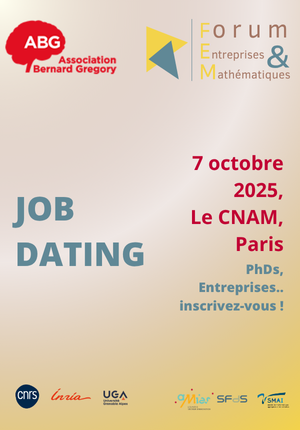Predicting nonlinear flow regions in highly heterogeneous porous media for the numerical simulation of underground storage
| ABG-132698 | Sujet de Thèse | |
| 27/06/2025 | Autre financement public |

- Mathématiques
Description du sujet
Eligibility conditions : Have resided in the USA in 2025.
Underground storage of CO2 and geothermal energy has become a major research area in the ongoing energy transition. In this context, it is important to model and simulate flows in highly heterogeneous porous media, characterized by irregularly distributed permeability profiles.
It is shown experimentally that these media do not follow Darcy’s law and that Forchheimer’s quadratic law is more adequate in the fast-flow zones. Applying Forchheimer’s law globally in the domain is very costly numerically. Instead, keeping Forchheimer’s law only where necessary should improve computing cost without much accuracy loss. Two new adaptive models have been recently proposed to couple the two laws; given a threshold on the flow’s velocity, they locally select the more appropriate law as they are being solved. At the end, each mesh cell is flagged as being in the Darcy or Forchheimer subdomain.
These new models are highly nonlinear, and so we do not expect them to be significantly faster than the global Forchheimer approach. Still, they are useful to find approximations of the subdomains; once these are known, it is fast to rerun a region-based simulation by directly applying each law in its region. In this thesis, we want to use the adaptive models to predict the subdomains as preprocessing for the region-based simulation and show whether the resulting approach is accurate and faster than the global Forchheimer simulation.
We will use the adaptive models as predictors by either running a classification algorithm over the mesh cells or by making simplifying assumptions on the shapes of the connected components of the Forchheimer subdomain. In the former case, the training will be performed by interpreting the models’ results as classifiers deciding for each cell whether it is Darcy or not. In the latter case, we will extrapolate information on the generic shapes (elliptical, tubular, graph-like, etc.) of the Forchheimer components from the known permeability profile. Neural networks will be used to predict these generic shapes as outputs with the boundary conditions as inputs. Finally, the thesis will combine the subdomain predictions with the region-based simulation and validate this combination in terms of accuracy and computing time.
Prise de fonction :
Nature du financement
Précisions sur le financement
Présentation établissement et labo d'accueil
IFP Energies nouvelles is a French public-sector research, innovation and training center. Its mission is to develop efficient, economical, clean and sustainable technologies in the fields of energy, transport and the environment. For more information, see our WEB site. All PhD students have access to dedicated seminars and training sessions.
Site web :
Profil du candidat
Academic requirements Master’s degree in scientific computing, applied mathematics
Language requirements English level B2 (CEFR), willingness to learn French
Other requirements Python, C++, interest in AI.
Recruitment requirement : Have resided in the USA in 2025.
Vous avez déjà un compte ?
Nouvel utilisateur ?
Vous souhaitez recevoir nos infolettres ?
Découvrez nos adhérents
 Nokia Bell Labs France
Nokia Bell Labs France  Groupe AFNOR - Association française de normalisation
Groupe AFNOR - Association française de normalisation  CESI
CESI  PhDOOC
PhDOOC  ADEME
ADEME  Institut Sup'biotech de Paris
Institut Sup'biotech de Paris  Tecknowmetrix
Tecknowmetrix  TotalEnergies
TotalEnergies  ASNR - Autorité de sûreté nucléaire et de radioprotection - Siège
ASNR - Autorité de sûreté nucléaire et de radioprotection - Siège  MabDesign
MabDesign  Aérocentre, Pôle d'excellence régional
Aérocentre, Pôle d'excellence régional  CASDEN
CASDEN  SUEZ
SUEZ  Laboratoire National de Métrologie et d'Essais - LNE
Laboratoire National de Métrologie et d'Essais - LNE  Généthon
Généthon  Ifremer
Ifremer  ONERA - The French Aerospace Lab
ONERA - The French Aerospace Lab  ANRT
ANRT  MabDesign
MabDesign


